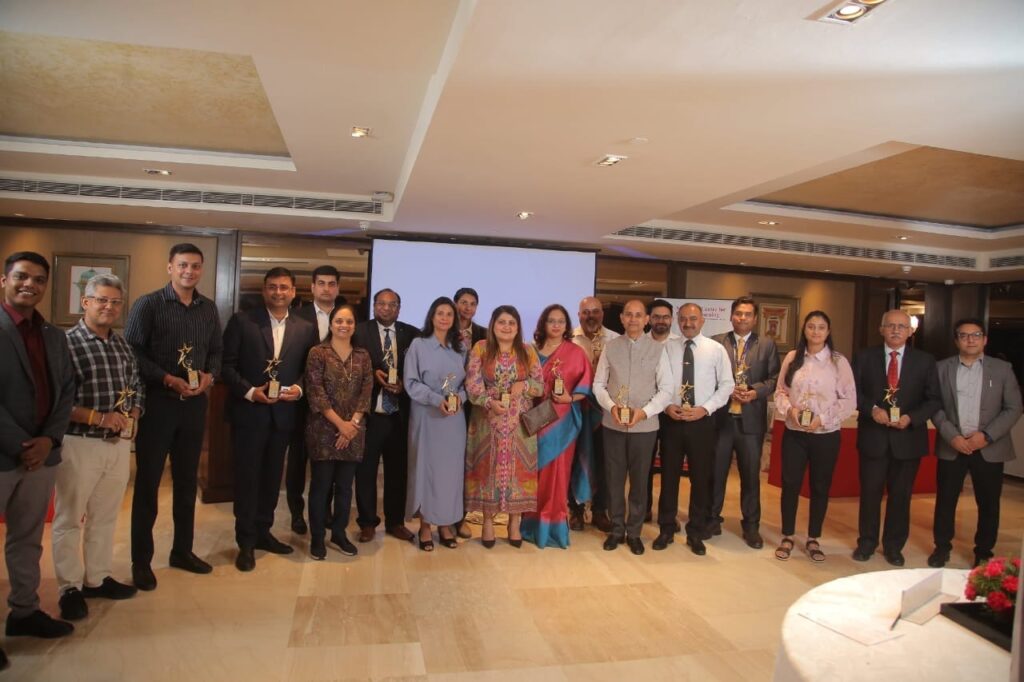
Pune, 8th July 2025 – As part of its 25th Silver Jubilee Year celebrations, Symbiosis Centre for Distance Learning (SCDL) organized a special HR Round Table Conference in Delhi. The event received an overwhelming response from various corporate HR professionals, career changers, and those looking to advance in their careers.
The discussions covered wide-ranging topics such as industry transitions, new work methodologies, emerging technologies and machinery, cross-collaboration across functions, best practices within companies, demand and supply of skilled talent, expectations versus realities in the corporate world, use of information, identification of fraudulent candidates, and the need for reskilling, upskilling, and cross-skilling. Attendees also received valuable insights on internal transformation, career mapping, current trends, and the future roadmap.
The event was graced by Dr. Swati S. Mujumdar, Principal Director, Symbiosis Open Education Society; Sonali Kadam, Deputy Director, SCDL; and Ashish Pandita, Corporate Head.
Prominent HR professionals from organizations such as Flipkart, Zee Entertainment Enterprises, Tata Consultancy Services (TCS), Niva Bupa Health Insurance, Capgemini, Shell, Christ University, Wipro, TELUS Digital, EZ Railway Infrastructure Ltd., Auric Group, iValue Infra Solutions, Fuji Electric, ANSR Global, Mecoson, Mitsubishi, CMS IT Services, and several others participated in the event.
Key Discussion Points:
Challenges Raised:
• The prevailing notion in the industry is that “the will issue is a skill issue.” Employees often resist adapting to new technologies and evolving work models, requiring significant efforts to mentally prepare them for change.
• One major challenge faced by all companies is setting goals for employees and preparing them for future tasks and roles.
• Sometimes business owners themselves are hesitant about cross-skilling, and they need to be convinced of its importance.
• Many industry leaders are unaware of future developments expected in the next 3–4 years, especially regarding the utilization of skilled human resources.
• With AI and machine learning impacting certain roles, there’s often no successor to step into the next level, creating gaps in the promotion pipeline.
• Cross-functional awareness is vital—R&D departments must understand marketing goals, and vice versa. If business owners lack clarity on these functions, it hampers strategic alignment.
• While many companies claim to provide training, the persistent shortage of skilled workers in the market calls into question the effectiveness of such initiatives.
Insights on Reskilling, Upskilling, and Cross-Skilling:
• Future leaders and newly promoted managers are often recruited from within. Hence, a structured system for talent development must be established internally.
• Continuous micro-learning should be embedded into routine work life. Employees benefit in the long term, and technologies like AI can assist in reducing negativity and boosting adaptability.
• Trust-building, identifying skill gaps, and addressing them during the education phase can better prepare future employees.
• Companies should plan a yearly roadmap for new employees and define support strategies for those whose skill levels fall below 50%.
• A nationwide Talent Academy and “Train the Trainer” programs can be introduced to scale talent development and empower trainers across regions.
• Clear steps must be taken to help low and medium-skilled individuals move to higher competency levels.
Strategic Observations:
• Companies must start identifying who might resign in the next 3 months, which roles are secure, and simultaneously begin preparing for future hiring needs.
• Aligning organizational goals with the HR department’s skill development strategy is key, especially when the required skills are not readily available in the market.
• In response, some companies are establishing their own skill development departments.
• Employee motivation, combined with experience, smartness, and capable leadership, can bring about impactful transformation.
• In many organizations, the lack of senior and inspiring leadership is a challenge. Unless learning is made engaging and exciting, employees hesitate to participate.
• To address this, educational institutions can bridge the gap by making skilling an integral part of formal education.
• Departments should review their needs monthly to identify required skill sets and accordingly plan recruitment and training.
• Corporates are increasingly collaborating to create “learning factories” and launch research projects and specialized programs.
• Continuous assessment of minor inefficiencies, willingness to embrace necessary changes, discarding outdated practices, and staying aligned with purpose, innovation, and emerging technologies is crucial.
• Companies must collaborate with educational institutions for training, patents, and MoUs.
• Regular encouragement and motivation for employees is essential.
• Selection today focuses on multi-skilled individuals, and automation tools are delivering optimized outcomes.
• To move ahead, alignment of behavior, capability, competence, and willpower is essential. Only then can goals be achieved.
• There is growing emphasis on developing a tech-commercially savvy workforce by training new entrants in the job market.
• Forward thinking and long-term planning can enable successful implementation and monetization of ideas.
As one of India’s leading autonomous educational institutions, SCDL has provided quality education to over 10 lakh learners and currently has more than 80,000 active students across the country. It offers specially designed postgraduate programs for graduates and working professionals. Established in 2001, SCDL is among India’s largest private distance learning institutes, delivering flexible, high-quality education to thousands of students in India and abroad. In addition to individual programs, SCDL also partners with national and international organizations to offer custom corporate training programs, of which this seminar was a part.
As part of the session, career guidance was provided to students on various emerging topics and industry opportunities.
Remarks by Dr. Swati S. Mujumdar:
Dr. Swati S. Mujumdar, Principal Director, Symbiosis Open Education Society, said,
“It is heartening to see corporate trainers, HR leaders, and alumni gathered here in such large numbers. SCDL emerged from Symbiosis Institute of Management Studies, established in 1995. It was started based on a suggestion from General Alu Valiya, who proposed offering courses for armed forces personnel who could not travel to Pune. This idea was presented to Chancellor Dr. S. B. Mujumdar and led to the formation of SCDL. In 2001, civilian learners and their children also started enrolling. When I returned from the USA in 2003, I took over the reins of SCDL. Back then, we had very few students and limited technology. In 2003–04, we launched e-learning, computerized programs, online exams, and on-demand testing—initiatives that helped connect with learners across India. We realized early on that careers related to technology and data would have strong future prospects. It is crucial to identify where your interests lie and choose a specialized skill area that can yield high-impact outcomes.”
“Symbiosis was started by a teacher. Dr. S. B. Mujumdar was an educator. There’s a big difference between a businessperson starting an educational institute and a teacher founding one. Today, Symbiosis alumni are making their mark not just in India but across the globe.”
To commemorate this historic milestone, SCDL is organizing a series of Career Growth Seminars across the country. This seminar in Delhi was part of that initiative, offering valuable and free learning opportunities for India’s youth and professionals.


Comments are closed.